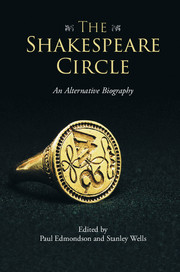Book contents
- Frontmatter
- Contents
- List of illustrations
- List of contributors
- Preface and acknowledgements
- General introduction
- Part I Family
- Part II Friends and Neighbours
- 12 A close family connection: the Combes
- 13 Schoolfriend, publisher and printer Richard Field
- 14 Living with the Mountjoys
- 15 Ben Jonson
- 16 Richard Barnfield, John Weever, William Basse and other encomiasts
- 17 Last things: Shakespeare's neighbours and beneficiaries
- Part III Colleagues and Patrons
- Closing remarks
- Afterword
- Index
- References
12 - A close family connection: the Combes
from Part II - Friends and Neighbours
Published online by Cambridge University Press: 05 November 2015
- Frontmatter
- Contents
- List of illustrations
- List of contributors
- Preface and acknowledgements
- General introduction
- Part I Family
- Part II Friends and Neighbours
- 12 A close family connection: the Combes
- 13 Schoolfriend, publisher and printer Richard Field
- 14 Living with the Mountjoys
- 15 Ben Jonson
- 16 Richard Barnfield, John Weever, William Basse and other encomiasts
- 17 Last things: Shakespeare's neighbours and beneficiaries
- Part III Colleagues and Patrons
- Closing remarks
- Afterword
- Index
- References
Summary
Shakespeare had direct and well-documented points of contact with three generations of the Combes, a prominent Warwickshire family of wealthy Protestant landowners closely associated with Stratford-upon-Avon throughout his lifetime and beyond. He must have been aware of various members of the family, and in varying degrees of intimacy, during all his adult life; some of them became close friends. Forenames, especially William, John and Thomas, tended to recur from one generation to another in different branches of the family. This has made them notoriously difficult to sort out; confusion is both easy and common, but the first Combe with whom Shakespeare had a documented association was a lawyer named William – I shall call him William Senior – whose career centred on Warwick but who had close links with Stratford where his father, John, lived.
William, a posthumous son, was born in June 1551. According to his entry in the History of Parliament he was ‘set to school and brought up in learning by some loving benefactors’. They did their job well: like several of Shakespeare's direct associates, such as Abraham Sturley and Richard Quiney, like Holofernes and Sir Nathaniel in Love's Labour's Lost – and, it may well be, like Shakespeare himself – he was as fluent in Latin as in English. A copy of A Profitable Book of the Laws of England, by John Perkins, a long-popular treatise on land law first printed in 1527, inscribed ‘Cest le liver de Gulihelme Combes’ – the equivalent of ‘William Combe, his book’ – along with the date of his admission to the Middle Temple in 1571, at the age of twenty, is in the collections of the Shakespeare Birthplace Trust. Written in Law French and printed in black letter, it is copiously annotated in a minute secretary hand in both French and Latin (but not, so far as I have observed, in English), suggesting that he was a learned and extremely diligent student. He was called to the bar on 9 February 1578 and became a Member of Parliament for Droitwich in 1589, for the town of Warwick soon afterwards, and for Warwickshire in 1597. (At this time Parliament met only sporadically.) He was chosen reader at the Middle Temple in 1595 and served as legal adviser to the Stratford Corporation from 1597 until his death in 1610, and as an ecclesiastical commissioner from 1601 to 1608.
- Type
- Chapter
- Information
- The Shakespeare CircleAn Alternative Biography, pp. 149 - 160Publisher: Cambridge University PressPrint publication year: 2015

